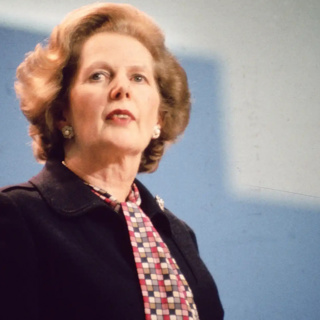
11. Transition
With no children of her own, what had Elizabeth I done to guarantee a smooth succession after her death? The answer is precious little. Which meant there had to be some clever footwork by her Chief Minister Robert Cecil, son of the William Cecil who had served so ably before, to ensure that the transition went well, peacefully and the way he wanted it. You'll not be surprised to learn that part of "the way he wanted it", was the way that ensured he kept his job. You can tell how that turned out by the illustration, which shows him confirmed in his post, a year later, at an international peace conference with Spain. As well as clever footwork, the death of Elizabeth was followed by exciting hoofwork, as the crazy Robert Carey galloped at breakneck speed northward to bring the good news to James VI of Scotland, soon to be James I of England too. Not that it was that crazy, seeing how well he did out of his adventurous dash (eventually)... The illustration shows the Somerset Conference of 1604, with Secretary of State Robert Cecil at the far right, with writing implements in front of him ©Juan Garcia/123RF.COM Music: Bach Partita #2c by J Bu licensed under an Attribution-NonCommercial-NoDerivatives (aka Music Sharing) 3.0 International License.
8 Tammi 20218min

10. Here today, no heir tomorrow
Elizabeth was the virgin queen. And indeed she had no children, which would be a bit of a problem for when she finally popped her clogs and the survivors had to try to find a way to make the succession to the throne reasonably peaceful. But was she really a virgin? And if she never married, was that down to careful international politics, equally careful national politics, or even the weird experience she had, as a teenager, of having an older man 'romp' with her? The illustration is a portrait of Elizabeth I ©Jose Georgios Kollidas/123RF.COM Music: Bach Partita #2c by J Bu licensed under an Attribution-NonCommercial-NoDerivatives (aka Music Sharing) 3.0 International License.
3 Tammi 20217min

9. Armada - the sequel
England loves stories about its great victory over the Spanish Armada. But it talks far less about its sequel. And, boy, was there a sequel: England's own Armada, against Spain. From England's point of view, it didn't go anything like as well as Spain's attempted invasion. Which probably explains why it's talked about some much less in English schools. The illustration shows a turret from the old fortress in A Coruña (Corunna) ©Jose Angel Astor/123RF.COM Music: Bach Partita #2c by J Bu licensed under an Attribution-NonCommercial-NoDerivatives (aka Music Sharing) 3.0 International License.
29 Joulu 20208min

8. The Armada. And the body of a weak and feeble woman
Spain sent its Armada against Elizabethan England, and the expedition ended in disaster, though far more for its failures of planning and the lousy weather than for anything the English did. Meanwhile, Elizabeth I had a great time when she went down to inspect the militia at Tilbury. Can you imagine? The only woman among 4000 admiring solders. She loved it. And gave an iconic speech to mark the occasion. The illustration shows the Spanish Armada in crescent formation pursued up the Chanelle by the English fleet under Lord Howard of Effingham ©Patrick Guenette/123RF.COM Music: Bach Partita #2c by J Bu licensed under an Attribution-NonCommercial-NoDerivatives (aka Music Sharing) 3.0 International License
24 Joulu 20207min

7. Not Piracy
They may have been preying on ships, attacking them, stealing their cargoes and holding their crews to ransom, but they knew for sure that they weren't pirates. They were loyal English sailors in Queen Elizabeth I's service. After all, she was making money from their victories, and no Queen could possibly be profiting from piracy, could she? Well, the Spanish had no doubts. They were certainly pirates. And they were seriously annoying. Chapter 7 of A History of England is about the seamen of Elizabeth's reign and their exciting acts of derring do (or piracy). The illustration shows the captain of the Spanish galleon Our Lady of the Rosary surrenders to Sir Francis Drake of The Revenge ©petervick167/123RF.COM Music: Bach Partita #2c by J Bu licensed under an Attribution-NonCommercial-NoDerivatives (aka Music Sharing) 3.0 International License.
19 Joulu 20207min

6. God
You may have noticed that religion has been a pretty significant factor in the happenings of the first few chapters, as it will be in quite a few of the ones ahead. So it makes sense to pause a moment and take a look at the role of God in the evolution of England in the sixteenth and seventeenth centuries. Illustration: The ceiling fresco Glory of Holy Trinity in church Santuario del Santissimo Crocifisso by Gersam Turri (1927-1929). ©sedmak/123RF.COM Music: Bach Partita #2c by J Bu licensed under an Attribution-NonCommercial-NoDerivatives (aka Music Sharing) 3.0 International License.
14 Joulu 20209min

5. Good Queen Bess
An exciting moment! Anne Boleyn's daughter, bright as her mother, in sharpness of mind as well as redness of hair, has made it to the throne. She's sick of all those quarrels between Protestants and Catholics, and decides that there's no need to pick fights with any Catholic subject who's discreet about his beliefs and remains loyal to the throne. The trouble is that the Pope keeps making life difficult for her, by denying her legitimacy and therefore her right to the throne. Can she therefore count on Catholic subjects who owe allegiance to the Pope as well as to herself? And what about her cousin, Mary Queen of Scots? She's openly Catholic. And, with French connections herself, she's Queen in a nation that sees itself as close to England's enemy France. When she falls out with her own people and has to take refuge in England, how should Elizabeth react? Episode 5 will tell you. The illustration is a later engraving of her chief adviser William Cecil urging Elizabeth to take action against Mary Queen of Scots. ©petervick167/123RF.COM Music: Bach Partita #2c by J Bu licensed under an Attribution-NonCommercial-NoDerivatives (aka Music Sharing) 3.0 International License.
9 Joulu 202010min

4. Bloody Mary
A Bloody Mary may be a fine drink, but Bloody Mary was hardly the most desirable of Queens. As the nickname rather suggests. She was England's last Catholic monarch, and she set out to undo her brother's Protestant work (though without giving any of the money back). Apart from that, she lost England's last Continental possession, Calais, and she married the man who would become King Philip II of Spain. His great contribution as King of England? To sort out the Navy, a high-minded action but one unintended consequences for which he'd pay heavily later. The illustration is a portrait of Mary Tudor, who became Queen as Mary I, but is best known as Bloody Mary. © juangarcia/123RF.COM Music: Bach Partita #2c by J Bu licensed under an Attribution-NonCommercial-NoDerivatives (aka Music Sharing) 3.0 International License.
4 Joulu 20208min






















